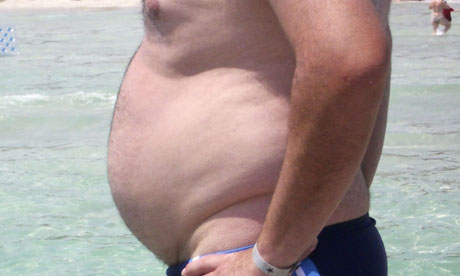
More men worry about their body shape and appearance – beer bellies, "man boobs" or going bald – than women do about how they look, according to research.
More than four in five men (80.7%) talk in ways that promote anxiety about their body image by referring to perceived flaws and imperfections, compared with 75% of women. Similarly, 38% of men would sacrifice at least a year of their life in exchange for a perfect body – again, a higher proportion than women.
"These findings tell us that men are concerned about body image, just like women. We knew that 'body talk' affected women and young people and now we know that it affects men too," said Dr Phillippa Diedrichs, from the centre of appearance research at the University of the West of England. She conducted the study, of 394 British men, which was commissioned by Central YMCA and the Succeed Foundation, an eating disorders charity.
The survey revealed that men have high levels of anxiety about their bodies and that some resort to compulsive exercise, strict diets, laxatives or making themselves sick in an attempt to lose weight or achieve a more toned physique.
• 80.7% talked about their own or others' appearance in ways that draw attention to weight, lack of hair or slim frame.
• 30% have heard someone refer to their "beer belly", 19% have been described as "chubby" and 19% have overheard talk about their "man boobs (moobs)".
• 23% said concerns about their appearance had deterred them from going to the gym.
• 63% thought their arms or chests were not muscular enough.
• 29% thought about their appearance at least five times a day.
• 18% were on a high-protein diet to increase muscle mass, and 16% on a calorie-controlled diet to slim down.
Rosi Prescott, Central YMCA's chief executive, said: "Historically, conversation about your body has been perceived as something women do, but it is clear from this research that men are also guilty of commenting on one another's bodies, and in many cases this is having a damaging effect." Men's high levels of body talk were symptomatic of a growing obsession with appearance, she added.
Some three in five men (58.6%) said body talk affected them, usually negatively. Some 12% said they would trade a year of life if they could have their ideal body weight and shape, 15.2% would give up two to five years, 5.3% would forego six to 10 years and 5.3% would sacrifice a decade or more.
Some 4% said they had made themselves sick to control their weight, while 3.4% reported using laxatives for the same purpose. Almost a third (31.9%) had "exercised in a driven or compulsive way" in pursuit of that goal, although that might have been partly due to 52% of the respondents being gym members, when the average is 12%.
Respondents, of whom about a quarter were gay men, blamed the media and celebrities for unhelpfully reinforcing unrealistic ideals of physical perfection. "Girls want to be slim and males want to be big and lean, and while it isn't a bad thing for people to want to look better, it has become more like a competition, which has a bad effect on most people's mental health", said one respondent.
Alan White, a professor of men's health at Leeds Metropolitan University, said: "These findings are worrying but not surprising. There's been a big increase in the numbers of British men having cosmetic procedures such as a nose job or removal of breast tissue; that's gone from almost nothing to quite a significant industry over the last 10 years. All this fuels the idea of the body beautiful and encourages a quick fix rather than appropriate diet and physical fitness levels."

